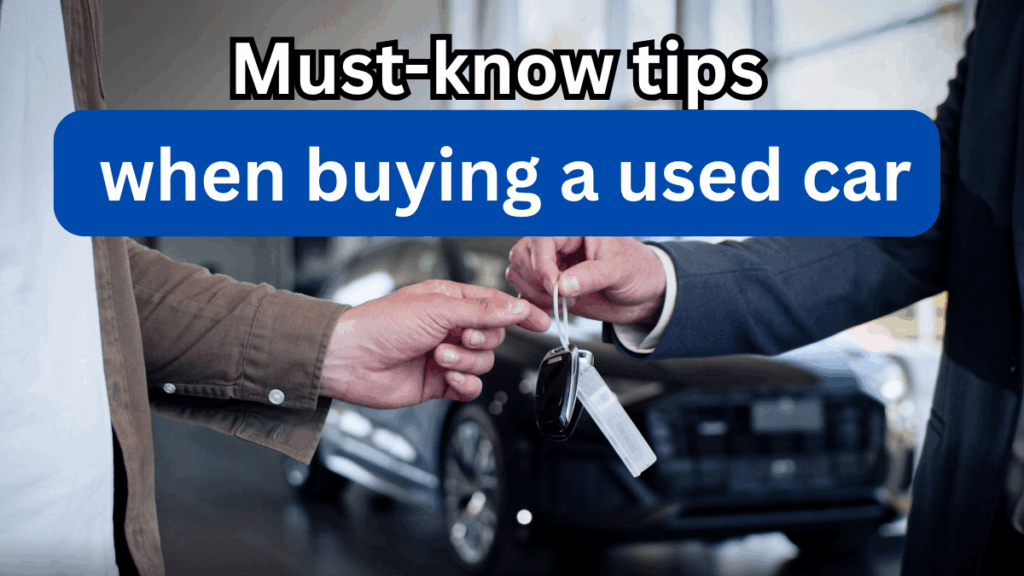Buying a used car can be exciting—but let’s be honest, it can also feel like navigating a maze. With so many listings, dealerships, and private sellers out there, it’s important to stay sharp and informed to avoid car scams. Whether you’re buying from a friend, a dealership, or online, having the right information and using a used car checklist can save you from making a costly mistake.
In this guide, we’ll walk you through practical tips for buying a used car, step by step—so you drive off with peace of mind, not buyer’s remorse.

Table of Contents
Do Your Homework Before You Start
Before stepping onto a car lot or replying to that tempting online listing, make sure to:
-
Research the car make and model you’re interested in.
-
Compare prices across platforms like Facebook Marketplace, Craigslist, and certified dealerships.
-
Check the average market value using tools like Kelley Blue Book or Edmunds.
-
Understand common issues with that specific model (some may be notorious for transmission or engine problems).
Use a Comprehensive Used Car Checklist
Don’t rely solely on the seller’s word. Always inspect the vehicle with a detailed used car checklist that includes:
Inspection Area |
What to Look For |
|---|---|
Exterior Condition |
Rust, mismatched paint, dents, cracks in lights or windshield |
Interior Condition |
Ripped seats, moldy smell, malfunctioning buttons and screens |
Engine |
Leaks, odd noises, warning lights on the dashboard |
Tires and Brakes |
Uneven tire wear, squeaky brakes, spongy brake pedal |
Test Drive |
Smooth acceleration, responsive steering, no pulling to one side |
Paperwork |
Title, service records, registration, VIN match on all documents |
Pro Tip: If you’re not confident, bring along a trusted mechanic or get a pre-purchase inspection done.
Watch Out for Red Flags
Scams in the used car market are more common than most people realize. Here’s how to avoid car scams:
-
If the price is unusually low, it probably is for a reason.
-
Be cautious if the seller refuses to provide a full vehicle history report (like Carfax).
-
Avoid pushy sellers or those who won’t meet in person.
-
Never trust escrow or payment services unless you’ve verified their authenticity.
Verify the Seller’s Legitimacy
Whether buying from a private seller or dealer, always:
-
Verify the seller’s ID and match it with the vehicle’s registration name.
-
Check online reviews if buying from a dealership.
-
Avoid sending money via wire transfer, gift cards, or cryptocurrencies.
Check the Paperwork Twice
The documents should be clear, consistent, and legitimate. Always review:
-
Vehicle Title (ensure it’s not salvaged or rebuilt unless you’re okay with that).
-
Registration and insurance status.
-
Maintenance and service history.
-
VIN – ensure it matches across the chassis, engine, and paperwork.
Take a Test Drive (Preferably Twice)
Never skip the test drive. This is your best opportunity to spot any issues. Focus on:
-
Braking performance
-
Engine responsiveness
-
Gear shifting (especially in automatic models)
-
Steering alignment
-
Any strange smells or noises
Final Buying Used Car Tips
Here are a few more useful nuggets to keep in mind before sealing the deal:
-
Always negotiate based on what you find during the inspection.
-
Don’t rush—walk away if anything feels off.
-
Get everything in writing, including “as is” agreements.
-
If buying through a loan, work with trusted banks or lenders.
Frequently Asked Questions
What’s the most important thing to check when buying a used car?
Check the vehicle history report and ensure it hasn’t been in major accidents. Also, run through a full used car checklist for physical inspection.
How can I avoid car scams when buying online?
Avoid paying upfront or using unusual payment methods. Meet in person, inspect the car thoroughly, and verify the seller’s identity.
Should I always get a mechanic to inspect the car?
Yes, especially if you’re not well-versed in cars. A trusted mechanic can spot hidden issues that could save you thousands down the line.
Are dealership-used cars safer than private sales?
Not always. Some dealerships offer certified pre-owned options with warranties, but always do your research and read reviews, regardless of where you buy.
Drive Smart, Not Sorry
Buying a used car doesn’t have to be a gamble. By staying informed, using a detailed used car checklist, and being alert to shady tactics, you can avoid car scams and make a smart, budget-friendly choice.
Click here to learn more
